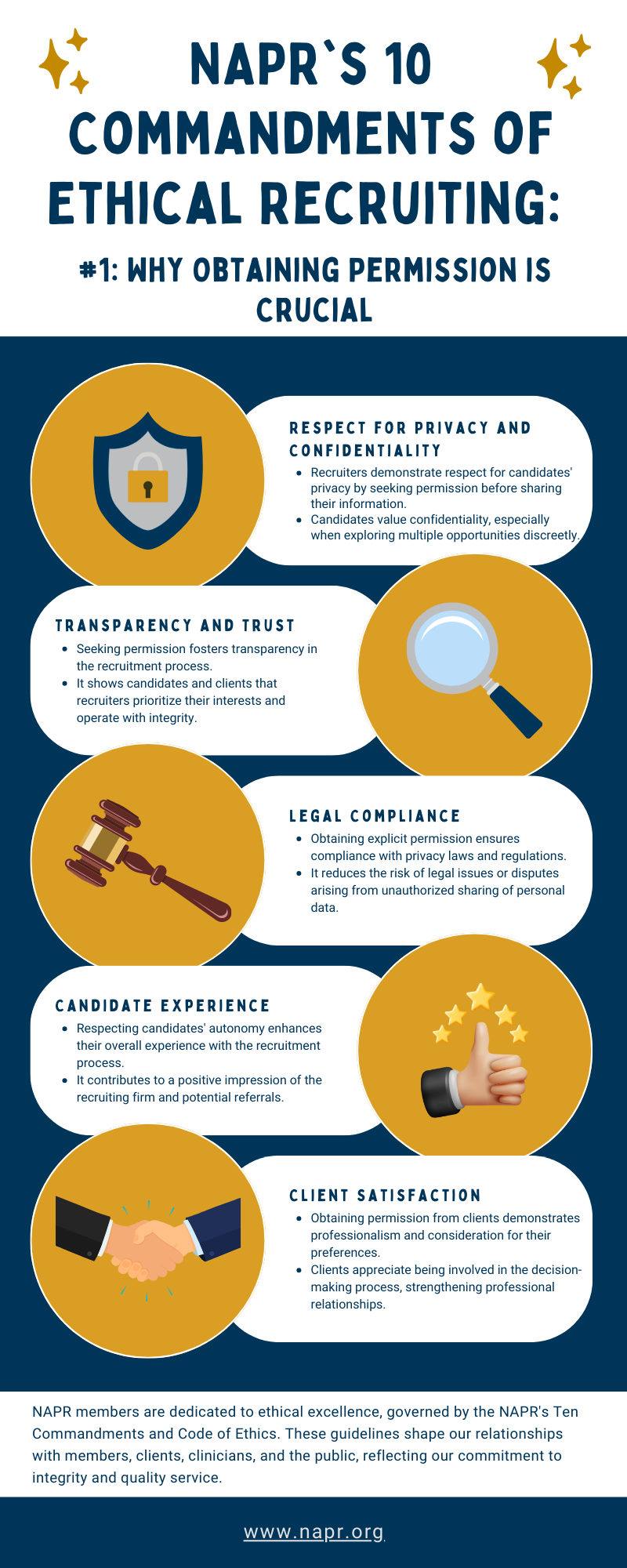First Commandment of Ethical Recruiting: NAPR members shall only refer a candidate to a client after receiving permission from both the candidate and client.
Obtaining permission from both candidates and clients before referring a candidate is crucial for several reasons: Respect for Privacy and Confidentiality: By seeking permission from candidates, recruiters demonstrate respect for their privacy and confidentiality. Candidates may not want their information shared without their consent, especially if they are currently employed or exploring multiple opportunities discreetly. This commitment to respecting candidates' privacy aligns closely with the ethical canons outlined in the NAPR Code of Ethics, particularly IV. Ethical Rules, A. Relations with Clients and Potential Clients, 4, which emphasizes the necessity of obtaining written consent from both parties before initiating any referral process. Transparency and Trust: Seeking permission fosters transparency in the recruitment process. It shows candidates and clients that recruiters operate with integrity and prioritize their interests. This transparency builds trust between all parties involved, leading to stronger professional relationships. By adhering to the ethical standards outlined by the NAPR, recruiters uphold the principles of integrity and transparency, maintaining the trust and confidence of their clients. Legal Compliance: In many jurisdictions, sharing a candidate's information without their consent may violate privacy laws and regulations. Obtaining explicit permission ensures compliance with legal requirements, reducing the risk of legal issues or disputes arising from unauthorized sharing of personal data. This commitment to legal compliance is fundamental to the ethical canons of the NAPR Code of Ethics, which guide members to operate within the boundaries of the law while maintaining the highest standards of professionalism. Candidate Experience: Respecting candidates' autonomy by seeking their permission enhances their overall experience with the recruitment process. It demonstrates that recruiters value their preferences and decisions, contributing to a positive impression of the recruiting firm and potentially leading to referrals or future collaborations. This focus on enhancing candidate experience is in line with the ethical principles outlined in the NAPR Code of Ethics, which emphasize the importance of treating candidates with dignity and respect throughout the recruitment process. Client Satisfaction: Similarly, obtaining permission from clients before referring candidates demonstrates professionalism and consideration for their preferences. Clients appreciate being involved in the decision-making process and having control over the candidates they consider for positions within their organizations. By prioritizing client satisfaction, recruiters uphold the principles of integrity and professionalism advocated by the NAPR, thereby strengthening the credibility and reputation of the recruitment industry as a whole. Obtaining permission from both candidates and clients before referring a candidate is essential for maintaining ethical standards, building trust, ensuring legal compliance, enhancing candidate experience, and satisfying clients. It establishes a foundation of respect, transparency, and professionalism in the recruitment relationship, as outlined in the NAPR Code of Ethics. |
